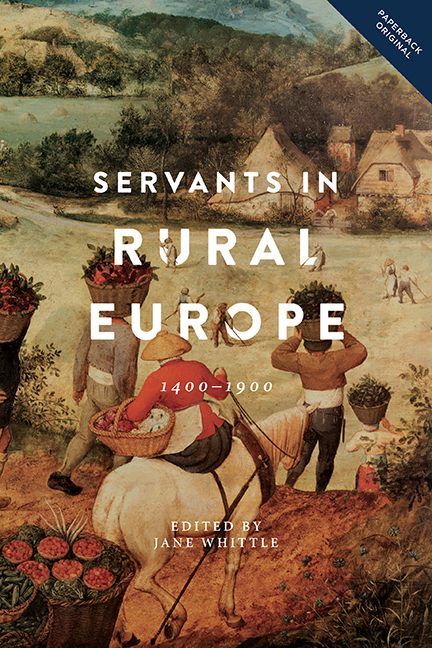Book contents
- Frontmatter
- Contents
- List of Figures
- List of Tables
- Note on Terminology
- List of Contributors
- Introduction: Servants in the Economy and Society of Rural Europe
- 1 The Employment of Servants in Fifteenth- and Sixteenth-Century Coastal Flanders: A Case Study of Scueringhe Farm near Bruges
- 2 The Institution of Service in Rural Flanders in the Sixteenth Century: A Regional Perspective
- 3 A Different Pattern of Employment: Servants in Rural England c.1500–1660
- 4 Female Service and the Village Community in South-West England 1550–1650: The Labour Laws Reconsidered
- 5 Life-Cycle Servant and Servant for Life: Work and Prospects in Rural Sweden c.1670–1730
- 6 Servants in Rural Norway c.1650–1800
- 7 Rural Servants in Eighteenth-Century Münsterland, North- Western Germany: Households, Families and Servants in the Countryside
- 8 Rural Servants in Eastern France 1700–1872: Change and Continuity Over Two Centuries
- 9 The Servant Institution During the Swedish Agrarian Revolution: The Political Economy of Subservience
- 10 Farm Service and Hiring Practices in Mid-Nineteenth-Century England: The Doncaster Region in the West Riding of Yorkshire
- 11 Dutch Live-In Farm Servants in the Long Nineteenth Century: The Decline of the Life-Cycle Service System for the Rural Lower Class
- 12 Rural Life-Cycle Service: Established Interpretations and New (Surprising) Data – The Italian Case in Comparative Perspective (Sixteenth to Twentieth Centuries)
- Select Bibliography
- Index
- People, Markets, Goods: Economies and Societies in History
10 - Farm Service and Hiring Practices in Mid-Nineteenth-Century England: The Doncaster Region in the West Riding of Yorkshire
Published online by Cambridge University Press: 18 April 2018
- Frontmatter
- Contents
- List of Figures
- List of Tables
- Note on Terminology
- List of Contributors
- Introduction: Servants in the Economy and Society of Rural Europe
- 1 The Employment of Servants in Fifteenth- and Sixteenth-Century Coastal Flanders: A Case Study of Scueringhe Farm near Bruges
- 2 The Institution of Service in Rural Flanders in the Sixteenth Century: A Regional Perspective
- 3 A Different Pattern of Employment: Servants in Rural England c.1500–1660
- 4 Female Service and the Village Community in South-West England 1550–1650: The Labour Laws Reconsidered
- 5 Life-Cycle Servant and Servant for Life: Work and Prospects in Rural Sweden c.1670–1730
- 6 Servants in Rural Norway c.1650–1800
- 7 Rural Servants in Eighteenth-Century Münsterland, North- Western Germany: Households, Families and Servants in the Countryside
- 8 Rural Servants in Eastern France 1700–1872: Change and Continuity Over Two Centuries
- 9 The Servant Institution During the Swedish Agrarian Revolution: The Political Economy of Subservience
- 10 Farm Service and Hiring Practices in Mid-Nineteenth-Century England: The Doncaster Region in the West Riding of Yorkshire
- 11 Dutch Live-In Farm Servants in the Long Nineteenth Century: The Decline of the Life-Cycle Service System for the Rural Lower Class
- 12 Rural Life-Cycle Service: Established Interpretations and New (Surprising) Data – The Italian Case in Comparative Perspective (Sixteenth to Twentieth Centuries)
- Select Bibliography
- Index
- People, Markets, Goods: Economies and Societies in History
Summary
Farm servants were agricultural workers who lived on the farm, traditionally hired for up to a year at a time, providing farmers with a continuously available supply of labour. While domestic servants were also employed in farmhouses, some farm servants worked both in the house and on the land. The extent to which farm service declined, survived or adapted in different parts of England during the nineteenth century has been a focus of historical debate since the 1980s. Ann Kussmaul argued that farm service declined in the south and east of England until it was virtually non-existent by the mid nineteenth century. This decline was associated with rapid population growth, a rise in poor relief expenditure, falling real wages for agricultural labourers and the rise in the cost of living. Consequently, the benefits of securing a constantly available supply of labour on the farm by employing live-in workers diminished. Conversely, Kussmaul argued that the north of England was a stronghold for the survival of farm service due to shortages of labour and competition for employment with industry.
This idea of a north–south divide of survival versus decline has increasingly been challenged. Alun Howkins and Nicola Verdon argued that in some southern and midland counties, farm service survived after the 1850s due to its ability to adapt. Farm service, they argued, might not have been the dominant system but it certainly continued to be important. They identified a link between farm service and areas where climate, soil and farming systems created a preference for a resident workforce, for instance as a result of dairying or close proximity to industrial employment. The work of Caunce and Moses on the East Riding of Yorkshire, and of Mutch and Gritt on Lancashire, has reinterpreted nineteenth-century farm service in the north as an important adaptation which was beneficial, if not crucial, for the development of modern capitalist farming, rather than an archaic survival of an outmoded practice. While collectively this work enhances our understanding of regional variation in farm service, and contributes an alternative northern perspective, nineteenthcentury farm service in many northern counties has yet to be studied.
- Type
- Chapter
- Information
- Servants in Rural Europe1400–1900, pp. 183 - 202Publisher: Boydell & BrewerPrint publication year: 2017

